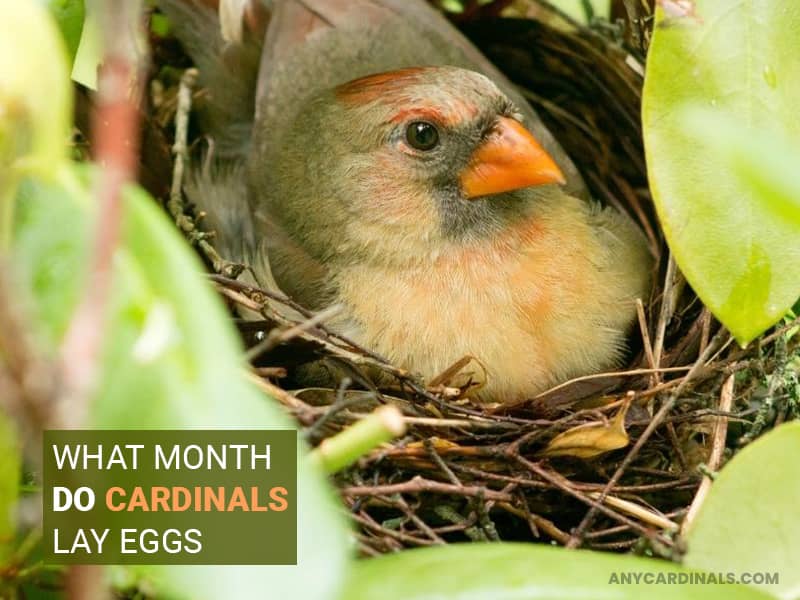How Big Are Cardinal Eggs?
Bird watchers have many questions surrounding cardinals. For example, what is their plumage color, how do they live, eat, and sing, and some birders even wonder how big are cardinal eggs.
And if you also wanna know the answer, here you go: cardinals lay normal-sized eggs. Their eggs’ length tends to range from 0.9 to 1.1 inches, and their width is around 0.7 to 0.8 inches.
But do you know their eggs’ color or when they lay eggs? If you don’t, you may continue reading this blog post to get more information on cardinals’ eggs. Let’s get started.
Check out these related blogs:
Everything You Need To Know About The Stunning Cardinal Eggs:
Below, we have shared all the answers to questions about cardinal eggs. So, without waiting any more, let’s get straight into these questions.
What Month Do Cardinals Lay Eggs?
As the arrival of spring marks the start of the nesting season for many birds, one of the most iconic species of the season is the cardinal. With its bright red feathers and cheerful call, cardinals are a welcome sight in many backyard habitats. While these birds are known for their wonderful singing, they are also prolific egg layers. So, when do cardinals lay eggs?

Whether southern or northern cardinals, they follow the same session for laying eggs. After two or more nesting attempts, cardinals lay their eggs from March to August.
What Color Is A Cardinal’s Egg?
If you have ever looked up into the sky and seen a bright red cardinal, you may have also been curious about what color its eggs are. After all, most birds have eggs that are various shades of blues, greens, and whites. So what color is a cardinal’s egg?

Like most other birds, cardinals’ eggs also tend to appear white, yet they are slightly different. These eggs are either buffy white or greenish white and covered with small pale gray or brown dots.
How Long Does It Take For Cardinals’ Eggs To Hatch?
Have you ever seen a cardinal nesting or heard their melodic song? They are beautiful birds that are a welcome sight in many gardens and yards. It’s no wonder that people often ask the question “How long does it take for cardinals’ eggs to hatch?”
Cardinals’ eggs take 11 to 13 days to hatch. After laying two to five eggs, the female cardinal sits on those eggs for the days mentioned above, and the male cardinals protect their territory and arrange food for all the family members.
Do Cardinals Abandon Their Eggs?
Cardinals are a beloved bird species, often hailed as symbols of good luck and joy. Cardinals are known for their bright red plumage and striking appearance, but they also have a unique habit of nesting and egg-laying that many people don’t know about. So, do cardinals abandon their eggs?
No, they don’t abandon their eggs, but they leave their offspring for some time during winter in preparation for the spring breeding season. Cardinal pairs wait for the young birds to grow, and once these babies leave the nest, parent cardinals leave them and build a new nest for the new brood.
Do Cardinals Leave Their Eggs If You Touch Them?
No, they won’t leave their eggs; instead, they will protect those eggs and may attack you if they notice you are touching their eggs.

So, cardinals leaving their eggs when humans touch them is a myth. However, you shouldn’t intentionally disturb the wildlife after knowing the myth.
What Animals Eat Cardinal Eggs?
Cardinals are a favored prey of a variety of predators, including cats, dogs, hawks, owls, snakes, and even humans. With so many predators, it’s no wonder that cardinal eggs are a coveted food source. So what animals eat cardinal eggs?
Various predators eat cardinals’ eggs; the noticeable ones are black racers, pilot black snakes, blue jays, fox squirrels, chipmunks, milk snakes, and more. Sometimes brown-headed cowbirds also eat cardinal eggs.
Can Cardinals Move Their Eggs?
Cardinals are a type of bird that is well-known for their bright red feathers and beautiful songs. They are a popular species of bird that many people enjoy watching in their gardens or local parks. Many people are familiar with the cardinal’s interesting behavior, but one question that often comes up is, can cardinals move their eggs?
No ornithologist has ever witnessed any cardinals moving their eggs from one nest to another. So, it’s evident that cardinals don’t move their eggs, but if you talk about whether they are physically capable of transferring eggs or not, yes, they are.
How Cold Can A Cardinal Egg Survive?
When it comes to the hardy bird known as the cardinal, there is no doubt that this species of bird is capable of surviving cold temperatures. But the question is, just how cold can a cardinal egg survive?
Freshly laid eggs can endure cold temperatures for a prolonged period. But cardinal eggs can’t tolerate temperatures below 29°F; eggs that reach such a temperature can freeze and cause the embryo to die.
How Long Can A Cardinal Egg Survive Without Heat?
Cardinals’ eggs don’t survive more than 3 hours in extreme cold without external warmth. But if the weather remains favorable, their duration of survival may exceed.

However, old eggs that have developed embryos can endure cold for a more prolonged time.
Frequently Asked Questions
What To Do If You Find A Cardinal Egg On The Ground?
If you find an unbroken egg on the ground, first, you should look for the nest. After seeing the nest, you can try to reach it and place the egg back in the nest. Or else, you can call a wildlife expert to take care of the egg.
How Do You Tell If A Cardinal Egg Is Alive Or Dead?
You can tell whether a cardinal’s egg is alive or not just by exploring some signs. FYI, alive cardinal eggs tend to be warm, unbroken, and exhibit visible veins under bright light. So, if you notice all these factors in an egg, it must be alive.
Can You Save A Cardinal’s Broken Egg?
Yes, you can save a cardinal’s broken egg by applying glue to the broken area of the eggshell. But before performing the repairing job, you should use antiseptic to kill the surface bacteria.
Will A Cardinal’s Cracked Egg Hatch?
Without repairing the egg, it’s not possible to get the egg hatched. That means cardinals can’t hatch the cracked eggs, but if the egg encounters any human and that birder repairs the egg correctly and arrange incubation for it, there is a high chance for the egg to hatch.
Final Words:
Like most bird species, cardinals remain protective and pose aggressive behavior when sensing any danger during incubation. Both the male and female cardinals will protect their hatchlings by any means until those baby cardinals grow young and leave the nest.
So, we can say their freshly laid eggs and juvenile mean a lot to them. Anyway, this is all about cardinal eggs; we hope this article gives you all the information about their eggs. If it does, we expect you to stay connected with us on Facebook, Twitter & Pinterest for more exciting content. Happy Birding.

